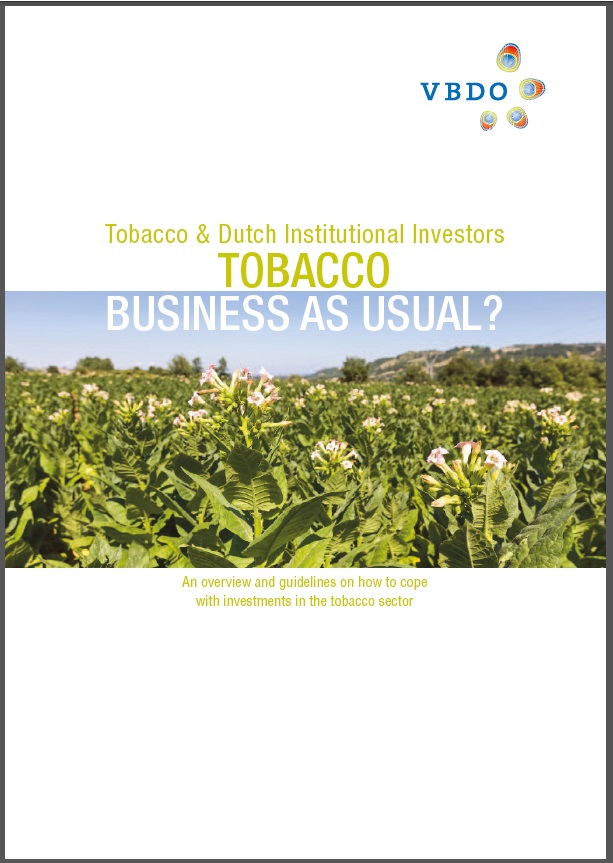Tobacco - Business as usual?
SUMMARY
The use of tobacco is unhealthy and this has been known for a long time. Half of its users will die of the consequences. For the Netherlands this means that every year 20,000 people die due to smoking. The World Health Organization estimates that tobacco kills 6 million people worldwide per year.1
Still investments in the tobacco sector are common in the investment portfolios of institutional investors. In this report we provide an overview of how Dutch institutional investors cope with tobacco investments and provide institutional investors with recommendations on how to formulate their own policy concerning tobacco. The findings are based on a questionnaire and in-depth interviews with institutional investors and experts.
Key findings include that of the responding institutional investors, 53% do not have a policy on tobacco. However, there are large differences between the types of institutional investors. For example, in the insurance sector, only 9% of the respondents have not created a policy. This is in sharp contrast to the responding pension funds of which 73% do not have a policy on tobacco.
When performing the literature study, four important ‘myths’ were discovered about investing in tobacco. Throughout this study we aim to disprove these ideas.
Four myths about investments in tobacco debunked
Myth 1: Tobacco remains a solid investment and will still offer high returns in the future
Apart from ethical questions surrounding investments in tobacco, these investments have in the past created high returns. However, there are growing financial risks associated with investing in the tobacco industry. In the West, the number of smokers has been rapidly declining. Regulation is also closing-in on tobacco sales in developing countries. The Framework Convention on Tobacco Control, signed by over 180 countries including the Netherlands, requires governments to take a specific set of steps to reduce the number of smokers. These steps are now being implemented worldwide. Even in China the number one producer and consumer of tobacco, for the first time in 20 years the number of smokers has declined. Countries like Australia are leading the way with effective regulatory measures and the rest of the world is following their lead.
Besides regulatory risks, the tobacco industry is confronted with growing risks of litigation. Increasingly, lawsuits are successfully filed against the industry on the charges of concealing the risks of smoking. All these developments will have an impact on the profitability of tobacco investments in the near future.
Myth 2: Smoking is a free choice and therefore it is not unethical to invest in tobacco
Tobacco is often compared to products like alcohol. It is a person’s free choice to drink or to smoke, but that is not entirely the case with tobacco. What separates tobacco from any other legal product is that it is highly addictive and immediately harmful. There is no safe level of exposure. The addictiveness of tobacco makes quitting very difficult. 80% of smokers in the Netherlands want to quit and half of the smokers try to stop every year. 90% of the smokers that have tried to quit start smoking again within a year. Two-thirds of smokers start when they are teenagers and are addicted by the time they are adults and are expected to make responsible decisions.2
Smoking is so addictive that even though the health risks are known (half of the smokers die of the consequences of smoking), many people are not able to stop. A Canadian tobacco will executive once stated that “smoking is not like drinking, it’s rather like being an alcoholic.”3 The fact that smoking is very addictive and people usually start smoking when they are in their teens means that smoking should not be seen as a simple matter of free choice.
Myth 3: The only sustainability concerns connected to the tobacco sector are health-related
The most common reason given for institutional investors to divest from tobacco is the issue of the health effects of smoking. However, there are many more Environmental, Social and Governance (ESG) issues related to the tobacco sector. Human rights violations like child labour, are common in the supply chain. Besides human rights issues, tobacco agriculture also creates environmental damage. Next to pollution from the heavy use of pesticides, tobacco growth leads to deforestation. Because growing tobacco depletes the soil much more than other crops, new areas of farmland need to be created.4
Myth 4: Institutional investors cannot divest from tobacco due to their fiduciary duty
Many investors point to their fiduciary duties and the need to deliver financial returns as a reason why they cannot divest from tobacco. Fiduciary duty means that institutional investors should invest in the best interests of their members. These best interests should be seen more broadly than in purely financial returns. According to the PRI (Principles of Responsible Investment) report ‘Fiduciary duty in the 21st century’, fiduciary duty is not an obstacle in acting on ESG factors. Nor is it an obstacle to divest from tobacco. Also the upcoming European directive “IORP2” states in article 20 that within the ‘prudent person’ rule pension funds are allowed to take into account the potential long-term impact of investment decisions on environmental, social, and governance factors.5
RECOMMENDATIONS
To define a policy on tobacco institutional investors move through several phases of policy development as shown in the figure below on page 13. On the basis of these phases we discuss in this section how to translate this to developing and implementing a policy on tobacco.
1 Ter Weijde, W., Croes, E., ‘Roken. Een aantal feiten op een rij’, Trimbos Instituut (juli 2015).
2 Trimbos Instituut, ‘Factsheet continu onderzoek rookgewoonten 2014’
3 Proctor, R. N., Why ban the sale of cigarettes? The case for abolition, Tobacco Control (January 2013).
4 http://www.tobaccoatlas.org/topic/environmental-harm/
To download the full report, please click here.

